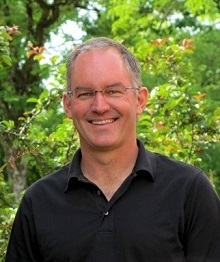
FAYETTEVILLE, Ark. – The Department of Entomology and Plant Pathology in the Dale Bumpers College of Agricultural, Food and Life Sciences is hosting research plant pathologist Niklaus Grünwald in a virtual seminar on Tuesday.
Grünwald is with the Horticultural Crops Research Laboratory in the USDA's Agricultural Research Service in Corvallis, Oregon.
The seminar takes place from 3:30 p.m. to 5:20 p.m. via Zoom link:
- https://bit.ly/3sv3Gft
- Meeting ID: 810 5065 7798
- Passcode: Spring2021
His presentation is "Novel Tools and Approaches Inform on Phytophthora Pathogen Emergence."
Grünwald is a courtesy professor in the Department of Botany and Plant Pathology and the Center for Genome Biology and Biocomputing at Oregon State University. He received his Ph.D. in plant pathology from the University of California at Davis and conducted postdoctoral research at Cornell University. His principal research interests include the ecology, genetics and management of emerging and re-emerging phytophthora diseases affecting ornamental and nursery crops with a special emphasis on the Sudden Oak Death pathogen Phytophthora ramorum and the Irish famine pathogen P. infestans.
He's also working on projects involving oomycete biodiversity, whole genome sequencing of the genus Phytophthora, and development of computational and bioinformatics tools for comparative genomics, genotyping-by-sequencing, population genomics and metabarcoding. He is also examining developing cyberinfrastructure for characterizing emerging plant pathogens using high throughput sequencing in real-time.
Grünwald has served as associate editor, senior editor and editor-in-chief for Phytopathology, editor for Plant Pathology, and currently serves as founding editor-in chief for CABI Agriculture and Bioscience and PhytoFrontiers. He has held numerous leadership positions, including chair of the APS Publications Board overseeing all APS journals that launched the new Phytobiomes open access journal. He is a recipient of the 2006 USDA ARS Early Career Scientist of the Year award; the 2007 APS Syngenta award; the 2015 American Physiological Society Ruth Allen Award recognizing outstanding, innovative research contribution that have changed the direction of research in any field of plant pathology; and became APS Fellow in 2016 and American Association for the Advancement of Science Fellow in 2019.
The seminar is open to everyone.
About the Dale Bumpers College of Agricultural, Food and Life Sciences: Bumpers College provides life-changing opportunities to position and prepare graduates who will be leaders in the businesses associated with foods, family, the environment, agriculture, sustainability and human quality of life; and who will be first-choice candidates of employers looking for leaders, innovators, policy makers and entrepreneurs. The college is named for Dale Bumpers, former Arkansas governor and longtime U.S. senator who made the state prominent in national and international agriculture. For more information about Bumpers College, visit our website, and follow us on Twitter at @BumpersCollege and Instagram at BumpersCollege.
About the University of Arkansas: The University of Arkansas provides an internationally competitive education for undergraduate and graduate students in more than 200 academic programs. The university contributes new knowledge, economic development, basic and applied research, and creative activity while also providing service to academic and professional disciplines. The Carnegie Foundation classifies the University of Arkansas among fewer than 3% of colleges and universities in America that have the highest level of research activity. U.S. News & World Report ranks the U of A among its top American public research universities. Founded in 1871, the University of Arkansas comprises 10 colleges and schools and maintains a low student-to-faculty ratio that promotes personal attention and close mentoring.
Topics
Contacts
Robby Edwards, director of communications
Dale Bumpers College of Agricultural, Food and Life Sciences
479-575-4625, robbye@uark.edu